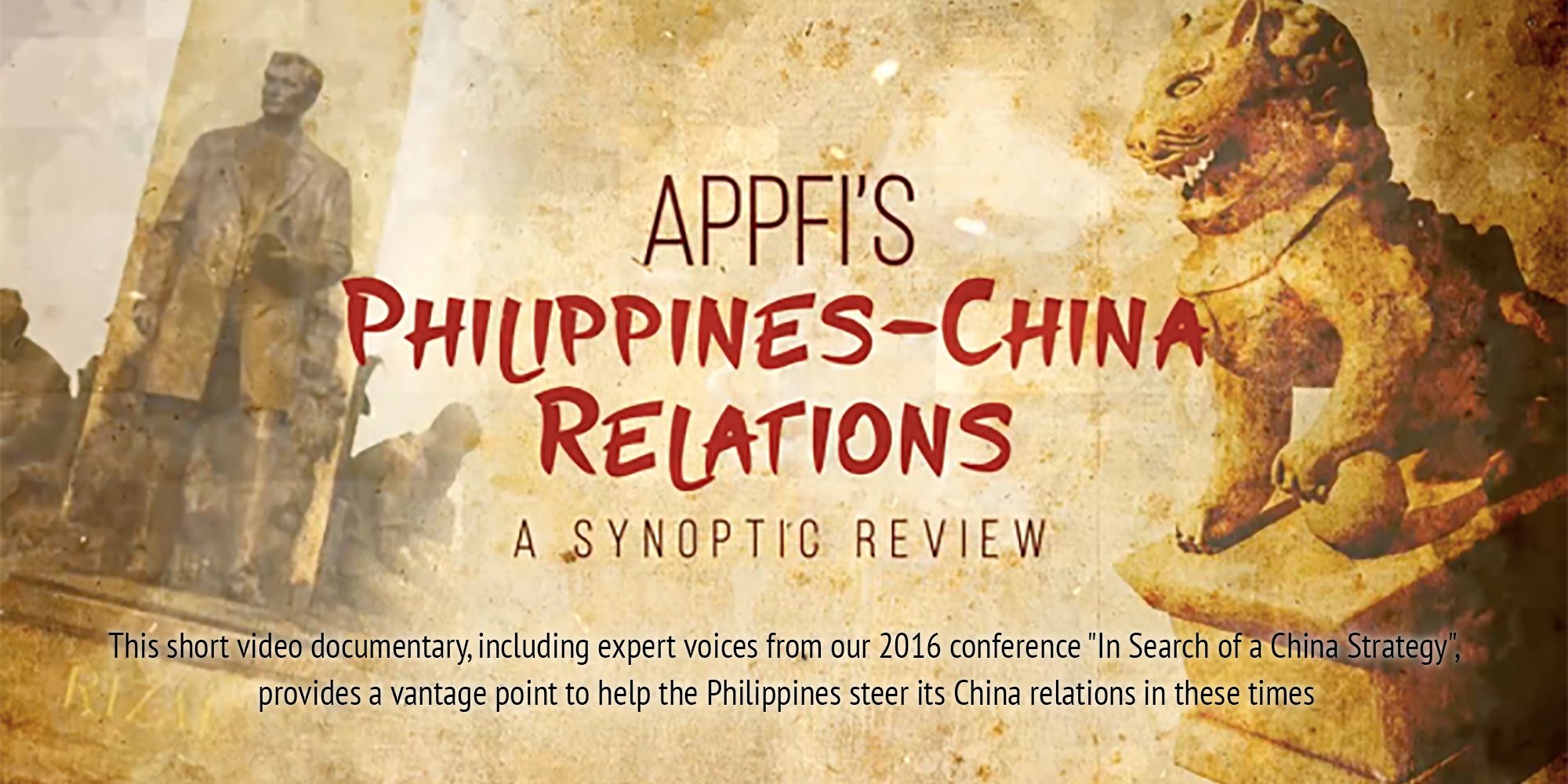Editor's Note
This last issue of our newletter for 2017 highlights the growing role of APPFI, together with other independent analysts, academics and civil society organizations, in collective efforts towards the betterment of the international community. “Track Two Diplomacy” is the fashionable short-cut to refer to this phenomenon, with the understanding that although official, state-to-state or “Track One” interactions dominate the world of diplomacy, we who are outside government also have a stake in the game.
APPFI initiated as well as actively participated in other civil society initiatives this year, involving Philippine cooperation with ASEAN, China, and India, among others. Within our modest resources, we continued to build networks of experts through the “Track Two Observer” project. Through various forums and conferences, we linked up with scholars, public intellectuals, entrepreneurs, and practitioners, giving as well as receiving the gifts of shared ideas, lively discourses, and insights both profound and inspiring. We were witness to some rather important events – ASEAN’s 50th anniversary celebrations and China’s Belt and Road Forum for International Cooperation, for instance.
We embarked on a new form of information dissemination that we had never tried before – the production of a video-documentary reviewing various aspects of Philippine relations with China. Please watch it here and share with us any feedback or questions you might have.
We hope that you enjoy reading our newsletter, and that you will stay on the journey with us as we welcome 2018.
News and Events
Track Two Observer Network: platform for information-sharing among analysts
Last October 20, the Asia Pacific Pathways to Progress Foundation Inc. (APPFI) held its first Track Two Observer (TTO) Discussion Forum at the Max’s Restaurant, Quezon City Circle with Rear Admiral Rommel Ong from the Philippine Navy as the guest speaker for the afternoon.
TTO is an APPFI initiative which aims to create an information sharing platform on Track Two activities relating to Philippine foreign relations and regional trends and developments of concern to the Philippines. It has two components – an online database and a discussion forum, both focusing on exchanges by Filipino analysts, scholars, and experts with foreign counterparts.
The TTO Discussion Forum was organized to serve as an avenue for analysts to meet and discuss recent developments, as well as to share updates on their Track Two engagements. The forum was attended by 16 members of the network, mainly from the academe, government, and private research institutions.
ASEAN, India highlight strategic convergence in commemorative forum
The academe, members of the diplomatic corps, and representatives from the Philippine government gathered at the ASEAN-India Forum to discuss the relations between the strategic partners and explore ideas on how to strengthen their cooperation.
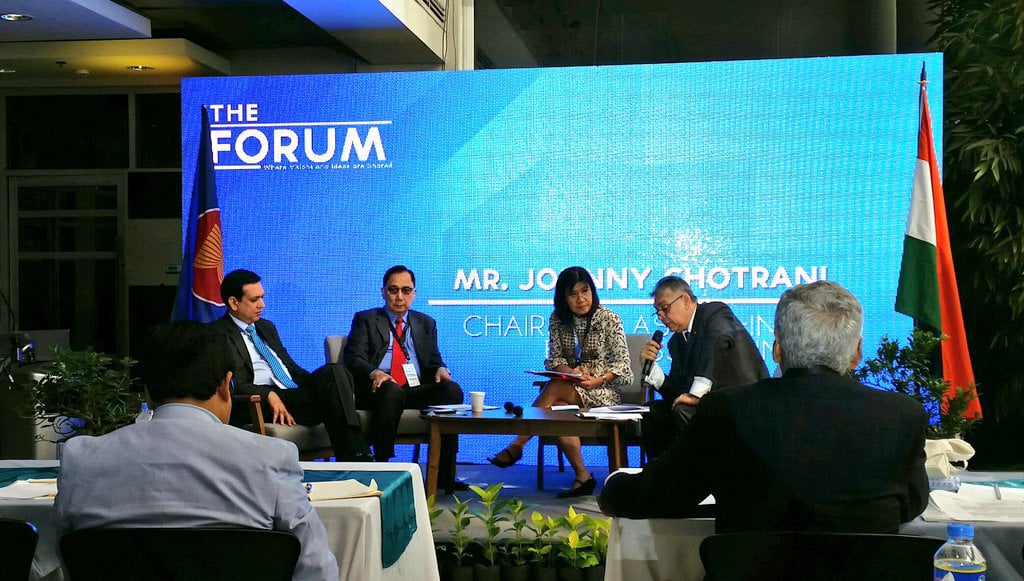
APPFI Vice President Dr. Antoinette Raquiza chairs the panel discussion on ASEAN-India trade and connectivity.
The panels centered on the South Asian power’s Act East policy, on its political convergence with ASEAN, and their areas of cooperation such as in trade, connectivity, and socio-cultural relations.
APPFI Participates in the 4th NACT Seminar
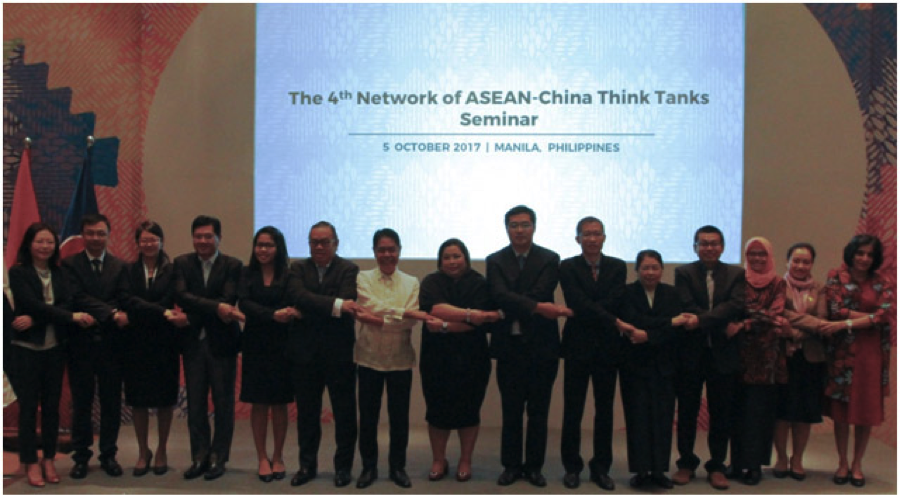
Country Coordinators and delegates shake hands the ASEAN Way with DFA Undersecretary for Migrant Workers’ Affairs Sarah Lou Y. Arriola and FSI Director-General Claro S. Cristobal during th 4th NACT Seminar.
The Asia Pacific Pathways to Progess Foundation Inc. was invited to participate in the 4th Network of ASEAN-China Think Tanks (NACT) Seminar held on 5 October 2017 at the AG New World Manila Bay Hotel, Manila. APPFI researchers Philip Vincent Alegre, Grace Guiang and Florence Principe represented the Foundation during the said event.
Human at the core: The story of my month-long stay in China
"China is the future"
I’ve heard of this phrase several times already and chances are you have too. With China’s economic growth and influence placing it on various daily news media platforms all over the globe, this phrase doesn’t sound like a far-fetched prophecy anymore. And yet, in the Philippines, we really don’t know much about China beyond the media portrayals. Perhaps it is time to delve deeper.
APPFI President Attends Workshop on Hedging Strategies, Discusses Trump, China And Asia At London School Of Economics Forum

Professor Baviera (foreground, left) with fellow participants held in London School of Economics.
APPFI President and Professor of the UP Asian Center Aileen Baviera was invited to speak in the Southeast Asia panel at “The Challenges of Trump’s America and Xi’s China: perspectives and strategies in Northeast and Southeast Asia”, a forum held on 8 September at the Saw Swee Hock Southeast Asia Centre (SEAC), Institute of Global Affairs, London School of Economics.
Second China-ASEAN Entrepreneurs Forum

Photo from CAE-Forum
Kunming, Yunnan province was the site of a major event organized by the Taetea Think Tank from December 7-10. This was the Second China-ASEAN Entrepreneurs Forum, on the theme “Jointly Progressing on Innovation-Driven Ground”. Sponsors of the event included the China-ASEAN Business Council, Finance Center for South-South Cooperation, Hong Kong Takung & Wenwei Media Group, Alibaba Research and the TAETEA Group. Parallel sessions on the themes of finance, tourism, health, think tank cooperation, ecological villages were held during the forum.
Seventh World Forum on China Studies
The Shanghai Academy of Social Sciences, in cooperation with the State Council Information Office and Shanghai Municipal Government, held the 7th World Forum on China Studies at the Shanghai International Convention Center on 10-11 December. Coming in the wake of the important 19th Congress of the Communist Party of China, the theme of the World Forum was “China Towards 2050: New Era, New Thought, New Journey”.
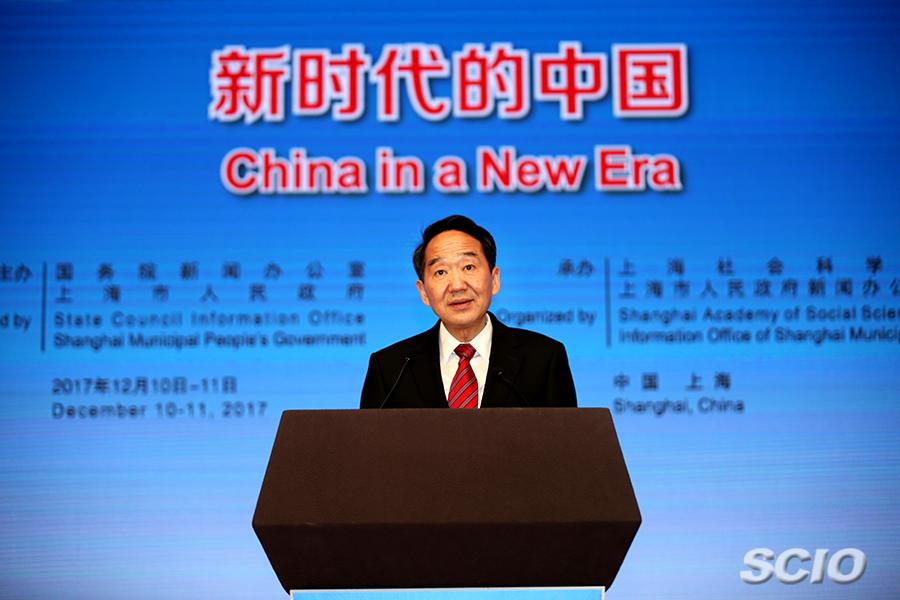
Photo from China.org.cn
PACS honors Ambassadors Chan, Sta. Romana and Villacorta and Atty. Mallare

Photo from PACS Facebook Page
On the occasion of its 30th anniversary on 2nd December 2017, the Philippine Association for Chinese Studies (PACS) paid tribute to four distinguished individuals in recognition of their contribution to Filipino-Chinese understanding. Honored were Amb. Carlos Chan, Special Envoy to China and APPFI Advisor; Amb. Jose Santiago Sta. Romana, a former PACS President, APPFI Fellow and now Philippine ambassador to China ; Amb. Wilfrido Villacorta, former Ambassador to ASEAN, APPFI Trustee and lifetime PACS member; and Atty. Florencio Tan Mallare, founder of World News, book author and benefactor of PACS.
Dr. Villacorta on the Conference Circuit
During the last quarter of 2017, APPFI Trustee Dr. Wilfrido V. Villacorta was invited by various overseas institutions to be a speaker at their conferences. On October 3, Dr. Villacorta gave a presentation on “Enhancing Ties, New Era for Turkey and ASEAN” during a conference commemorating the 50th Anniversary of ASEAN and marking Turkey’s accession as a Sectoral Dialogue Partner of ASEAN. The event, sponsored by the Center for Strategic Research of the Ministry of Foreign Affairs of the Republic of Turkey, was held at Ankara, Turkey.
On November 9, Dr. Villacorta was one of the keynote speakers at the 10th China-ASEAN Think Tanks Strategic Dialogue. His topic was “The Dawning of a Higher Level of ASEAN-China Partnership.” The event was co-sponsored by the Chinese Academy of Social Sciences and the Guangxi Academy of Social Sciences and was held at Nanning, Guangxi, China. (To view his powerpoint presentation, please click here.)
Commentaries *
Power Shift and the South China Sea: Questions for the Philippines
Fareed Zakaria, writing on the “post-American world” in 2008, began by saying “this is not a book about the decline of America, but rather about the rise of everyone else”. He argued that while America would still be the most powerful nation on earth, its relative power will be diminished. US liberal policies themselves had encouraged growth in other parts of the world, allowing China and India in particular to become powers in their own right, he said.
In October 2017, the same author Zakaria wrote a short opinion piece about the historic significance of China’s 19th Communist Party Congress. With a fresh 5-year mandate and having emerged as the strongest Chinese leader since Deng Xiaoping, President Xi Jinping announced to the world that not only would China continue to strive to be a power, but that its own model offered “a new choice” for other countries. Zakaria then cited surveys by Pew Research Center that showed how countries like Australia, Netherlands and Canada now have a more favorable view of China than of the U.S., and that Germans, Chileans and Indonesians were among the people who had greater confidence in the leadership of Xi Jinping than that of Donald Trump. He observed, this time, that "The shift in reputation that we are witnessing around the world is not so much about the rise of China but rather the decline of the United States."
Converging Joint Development and Philippine National Interests

Photo from Gazette Review by Lindsey Burrows
Joint development of maritime resources is hailed as a feasible approach between countries that are locked into overlapping boundaries or maritime claims. The term “joint development” is loosely used as simply referring to developing and exploiting resources together. As an international practice, joint development is in line with the United Nations Law of the Sea (UNCLOS) wherein states, pending agreement of delimitation of boundaries or continental shelf, shall make an effort to enter into provisional arrangements of a practical nature which shall be without prejudice to the final delimitation.
ASEAN and India: Terrorism, Cyber, and Maritime Security Cooperation
After five months in battle, Marawi City in the Philippines was declared liberated from the control of the homegrown pro-ISIS Maute group. The attack was significant not just for the Philippines but also for ASEAN, as terrorists were attempting to obtain a foothold in the Southeast Asian region. However, the liberation should not make ASEAN complacent. With the growing threats of terrorism and its use of modern technology, ASEAN should beef up security measures and work with other countries that share these security concerns.
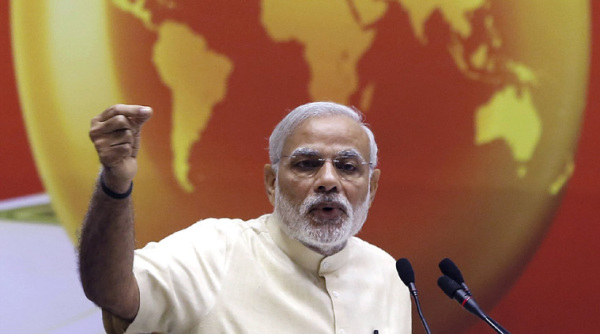
Photo from The Indian Express
ASEAN at 50: Celebrating the Achievements and Confronting the Challenges
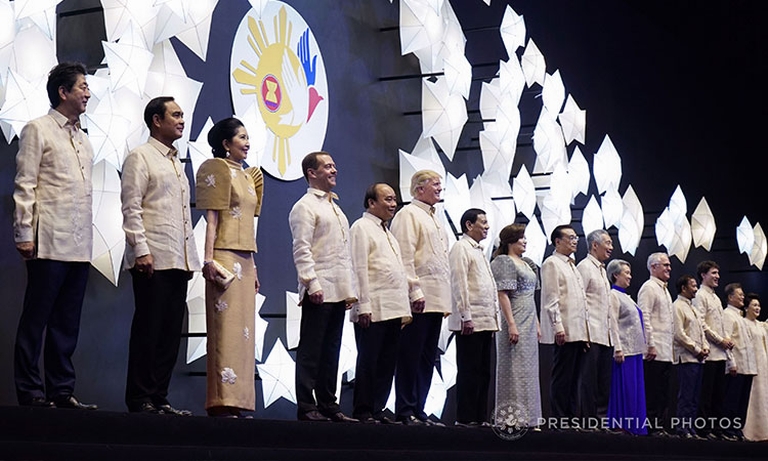
Photo from PCOO.gov.ph
The Association of Southeast Asian Nations was established in 1967, driven by the desire of states to cooperate in various fields, and to promote regional peace and stability. In the last fifty years, ASEAN achieved much and fostered cooperation between member-states in free trade agreements, agriculture, trade, tourism, energy and culture; promoting human rights, anti-trafficking of persons and cybersecurity; protecting the environment, disaster management, emergency response; as well as in science and technology. Still, the next steps on ASEAN’s path – represented by its 2025 Vision - are rife with challenges.
Japan’s discomfort with history and the PH dilemma
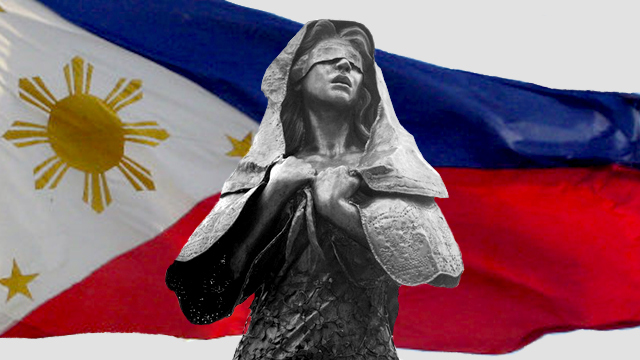
Photo from Rappler
Manila is now under pressure after the Japanese embassy expressed concern over a statue to commemorate "comfort women" put up along Roxas Boulevard on December 8. Wartime atrocities, including comfort women forced into sexual slavery by the Japanese Imperial Army during World War II, continue to mire Japan’s relations with its neighbors, notably China, Korea, and the Philippines. But over time, Japan’s soft power, investments, and overseas aid softened the position of most Southeast Asian countries, including the Philippines. While surviving comfort women became national figures in Korea, their Filipina counterparts have become marginalized and Philippine authorities have become largely indifferent to their legitimate demands for an official apology and compensation from Japan.
*The views expressed are the author's alone and do not constitute official positions of APPFI.

